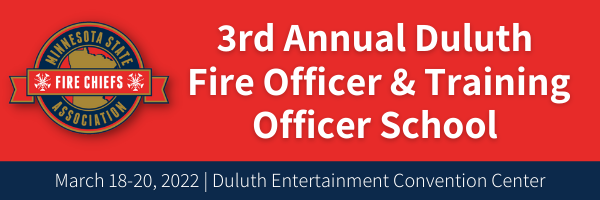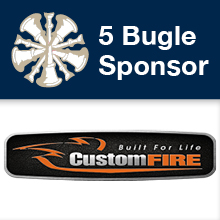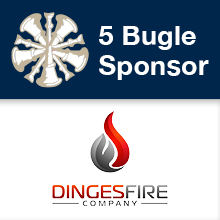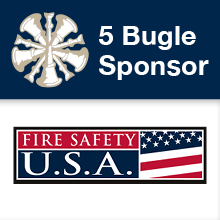2022 Duluth Fire Officer & Training Officer SchoolMarch 18-20, 2022 | DECC | 350 Harbor Drive, Duluth, MN 55802
Class InformationAttendees can register for one (1) 12-hour class, which is held on Saturday and Sunday OR one (1) 8-hour class, held only on Saturday, along with one (1) 4-hour class, held only on Sunday. Please see descriptions below: 12-Hour ClassesBuddy to Boss Each and everyday Emergency Services respond to numerous calls that require different approaches to best control the situation. Often, the decisions of controlling that situation happen within seconds. Some of these situations end up going longer than the “normal” call. This critical thinking session is designed to provide you a background and enhance your decision making on a scene both initially and long term incidents. Learn from case studies and lessons learned on the ICS City a 5 ft. x 32 ft. training city that you will be utilizing during the session. The session scenarios will start at a baseline level and grow in intensity and complexity. The ICS City allows for students to utilize the concepts learned during class and their “real world” experience and apply to the exercise that is unfolding in front of them “in the city”. The session will have training components and many “hands on” opportunities with the ICS City.
The First Five Minutes - Actively Developing the Skills You Need The goal of "The First Five Minutes" is to provide the firefighter sitting in the right-seat of the first due apparatus an opportunity to develop the skills necessary to make the right decisions based on the application of the initial functions of Incident Command. A combination of presentations, case studies, and scenarios with class participation will be used to assist the participant in developing these skills. The primary goal/function of a hazard zone management/command system is providing for the safety of the firefighters who are performing the tasks that stabilize the incidents problems. Most of the time this work takes place in a highly volatile, fast paced, IDHL atmosphere (a hazard zone). We are summoned to solve a problem and we usually create solutions to the problem through action. The initial size-up produces the information that becomes the basis for the incident strategy and action plan (IAP). Investing a small amount of time evaluating the critical factors is extremely important to both beginning and on-going command and operational success as well as firefighter safety. Current, accurate, and relevant information obtained by the IC in the front end of the event will generally provide the information foundation for initial and on-going effective action. Framework for Success This two-day course provides the supervisor with the knowledge and skills to perform successfully in the fire and Emergency Medical Services environments. The course addresses professionalism, resilience, emotional intelligence, and situational awareness, as well as managing conflict, delegating, mentoring, coaching, empowering, and building collaboration and synergy for professional growth. Fire Ground Management Participants will learn the importance of conducting a thorough size-up before committing limited resources. This course will develop company officers’ incident scene supervisory and management capabilities in structural fire operations. Key content includes discussion and scenario-based practice on controlling and implementing the activities that need to be done to successfully deal with personnel performing the following operations; rescue and ventilation, confinement and extinguishment, water supply, exposures, offensive and defensive operations, salvage, overhaul and support. This course takes a practical, common sense approach to fighting fires in single-family homes, multi-family apartment buildings, light industrial and commercial structures. It takes into account the realities of today's fire service–that is, most fire departments in this country are, understaffed, less experienced and involved in more EMS than ever before. If your incidents seem to run themselves and you’re not in control, then this course is for you. 8-Hour ClassesInstructor Continuing Education Fire Instructors and Training Officers are an essential position within the Fire Service. If you are already a Training Officer/Instructor/Officer you already have the baseline to set-up successful trainings, but can we improve the final product with some simple tweaks? What can we do with the over stimulated firefighters that want to be a Training Officers or Instructors but do not meet the qualifications yet? This program will look at the learning environment, skill based-training beyond the classroom, developing training schedules, training safety officers, training instructors mentoring, county/region-wide training programs and a variety of other topics! Dealing with Difficult People and their Organizational Impacts This program is taught across the United States at statewide conferences, and at international programs such as FDIC and Fire-Rescue International. The focus is on managing complex and difficult personnel issues, improving your interpersonal skills, and elevating your organization to become a winning team. Share in the journey of the instructor, who, as a new chief hired from the outside, quickly learned that his education and experience did not prepare him for the complex personnel issues he would face--“difficult people.” His story made headline news, and his life could have ended as he came face-to-face with a difficult employee. Learn the definition of a “difficult person” and how our generational differences (beliefs, work ethic, and so on) necessitate frequent adjusting to tune the elite team we need to become. You will learn how to resolve conflict and bad behavior through role-playing in scenarios involving several of the typical personality types encountered inside the fire station. This class will be instructor lead using motivating and interactive discussion and role-playing. Current PowerPoint visual displays will be used as well as thought-provoking scenarios and questions. Students will be asked to share their experiences, and I included real-life situations, and scenarios students will need to review and interact with. Students will see how their decisions line up with their peers in class. New Training Officer: I'm the Training Officer, Now What? So you're in charge of training/drills for your department, now what? This class is designed to assist those who are new to the training officer role. This class will cover the basics from creating your annual training schedule, what are we required to do each year, creating a training outline, budgets and funding and available resources to your as an instructor. Leadership for Large Events One of the emerging challenges for today's public safety leaders is dealing with large events being held within their communities such as wedding barns, parades, festivals, concerts, etc. The challenge is how to approach the hidden issues surrounding these types of events before tragedy strikes. The hidden issues will be the foundation to the question you will need to answer from the political leaders on “why” your department was was challenged during the response. Within this class, you will look at after action case studies from events which have ended up in tragedy. From there we will identify “who” are the players, what motivates them and how to address the issues. Finally, what steps can be taken to do some simple tactical planning which leads into operational deployment to minimize your risk if the event does not go as planned. 4-Hour ClassesTechnology for Officers Do you want to expand your toolbox of instructional and developmental techniques? Do you want the information you are conveying to be retained and recalled appropriately? Do you want your message to be engaging, interactive, and cool? We know you do, and so does your firefighters. Officers and instructors have grown a bit complacent with their understanding and use of technology in the fire service. This presentation explores technological tools that fire officers and instructors can leverage to refresh and increase their crew's cohesiveness, training, and effectiveness. This program will examine mobile apps, software, simulations, and much more. These assets can take you far beyond the traditional lecture and slideshow methodology of instruction and development. The highlighted resources synchronize with a modern firefighter's technological expectations and align with how and where they interact with information. A dynamic and adept officer or instructor can utilize this knowledge to increase their firefighter's retention and enthusiasm for learning and developing. You will leave with an arsenal of ready-to-use, low-cost options for maximizing your training and leadership efficacy in today’s digital information age. State Fire Marshal Topics include:
Tactical Medical Response - NFPA 3000 All of our communities respond to critical incidents throughout given year. In today’s world, responding to an incident involving an act of violence is inevitable. Knowing how to plan, train and properly respond is the key to success. Within this course, you will go through case review of incidents throughout the U.S. focusing on the lessons learned from which you can better respond. A specific focus will be on EMS response and how to operate in partnership with Law Enforcement to operate as a tactical medical team. Finally, exercises will help reinforce ideas for your own department's training. |







